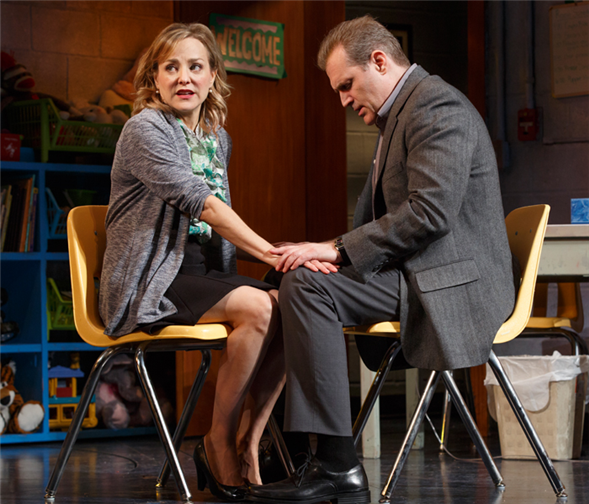Translate Page

Why Geneva Carr devoted the last four years of her life to Hand to God
---
Welcome to Building Character, our ongoing look at performers and how they create their roles
Geneva Carr has a knack for being in the right place at the right time, and she also trusts her gut. That winning combination inspired her to famously change careers from banking to treading the boards after seeing Appointment with a High-Wire Lady at the Ensemble Studio Theatre, where she eventually became a member. But it's also why she stuck around for four years as fellow ESTer, playwright Robert Askins, developed Hand to God, the Tony-nominated dark comedy about the strange goings-on in a small-town Texas Christian Puppet Ministry.
"Sometimes it's hard to explain to people who aren't artists," she says. "When we did the show at EST for six months, I lived on savings. I believed in the play that much. I just thought it was amazing. Love is why we do theatre, why we commit when something's not a paycheck or a career boost. Although I enjoy TV and movies, most of my 'aha moments' have come from seeing shows. There are so many plays that were pivotal in my life, that changed my perspective and got me out of depressions. "
Carr and Askins met at an EST Pick Party, where dramatists draw a title and the names of a director and a cast of actors out of a hat, then have two weeks to write and put on a show. That first collaboration, Matthew and the Pastor's Wife -- in which Carr's devout character used some very unconventional methods to counsel a philandering husband -- ended up being produced in EST's 2010 Marathon of One-Act Plays. About a year later, Askins said he had a play he wanted Carr and another EST member, actor Steven Boyer, to read.
"EST is an amazing place if people want to work and try new things," says Carr. "They have all these writers groups. Most of what you do is for free, but I have worked with so many incredible playwrights there. Matthew and the Pastor's Wife was gory and intense, and it touched on all the themes Rob deals with. Then he wrote [the first incarnation of] Hand to God in three weeks and asked me and Steve to do a cold reading at Pace University. He told us was that there would be a puppet, so Steve Googled "easy puppets" and found out how to make a sock puppet with some wire-hanger arms. We showed up and right away we knew we had something special. For the next few months, we did reading after reading, and the play always had something magical and funny. Then Moritz [von Stuelpnagel] came on and the way he attacked the material was very different from any other director. We were out there playing a tragedy, not a funny, ridiculous, campy play. It's a mother and son dealing with grief, and neither of them can express their emotions."
{Image1}
Of the five-person cast, Carr and Boyer are the only actors who have remained with the show from the very beginning. There was buzz about it transferring to Broadway almost from the get-go, and though Carr found that exciting at the time, she's glad she ended up with four years to watch the play evolve and work on her role. "We had the luxury of development," she says. "After EST, it transferred to MCC, which is another developmental theatre and god dammit if they don't commit! We changed the ending of that play every single night for 10 shows! They didn't worry about it being a finished product; they wanted it to be the best it could be. Jesus, did we go through the ringer, but Rob would never have had the play we have today."
Carr's character, Margery -- a grieving widow who's at the end of her rope and desperately trying to connect with her son, who may or may not be possessed by his hand puppet, Tyrone -- has changed a lot. "In the original show, she supported her son's journey, but now she has a journey that is equal to his," she says. "Her demons are just as dark, and she's not an innocent. In the beginning, people were like, 'Oh this poor mother.' Now she has a Tyrone herself. Mother and son mirror each other in ways they didn't before. "
One of the biggest changes over the iterations was a physical one. "I used to hurt myself and now I'm not the cause of my injury -- I don't want to reveal too much!" Carr says. "I remember Rob and Moritz talked a lot about, 'What is the play saying? Why does someone get hurt and what does that mean?' In the original, I took a cross, smashed it on a table and stabbed my hand. I don't do that anymore."
Even though she's been playing Margery for so long, she can't imagine the part ever getting stale, a good thing since the play doesn't look like it will close anytime soon. She says she has Askins' writing to thank for keeping it perpetually fresh. "It's so visceral and real, you don't have to act in between the lines. There's an immediacy to everything happening in this play. A few weeks ago I was sick and missed a few shows and when I came back, it felt brand-new again. That's what four years of workshopping a play allows you. "
---
Raven Snook is the associate editor of TDF Stages
Photos by Joan Marcus. Top photo: Geneva Carr and Marc Kudisch